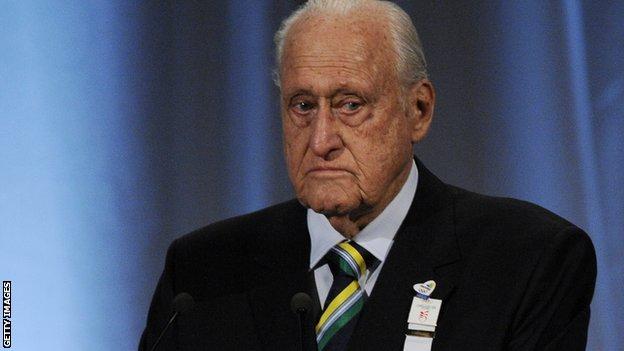Joao Havelange, Fifa's honorary president, resigns over bribes
Last updated on .From the section Football

Joao Havelange, 96, has resigned as Fifa's honorary president after a report ruled he had taken bribes.
The Brazilian was described as "morally and ethically reproachable" for taking kickbacks from a World Cup rights marketing agency.
The report by Fifa's ethics chairman Hans-Joachim Eckert also claimed Nicolas Leoz had received bribes.
Leoz, 84, resigned from the governing body's executive committee last week, citing health and personal reasons.
The Paraguayan was accused in the report of being "not fully candid" in his explanations over the affair.
However, while the report says that payments made in the 1990s to Havelange, who was Fifa president from 1974 to 1988, Leoz and former Fifa executive Ricardo Teixeira, Havelange's son-in-law, qualified as bribes, they were not crimes at the time.
Fifa granted International Sport and Leisure (ISL) exclusive rights to market World Cup tournaments to some of the world's biggest brands. ISL also received millions more from negotiating television broadcast rights.
The company collapsed with huge debts in 2001 and its arrangement with Fifa was subsequently investigated by Swiss authorities.
Fifa was eventually forced by the Swiss supreme court to release documents relating to the case after it repeatedly attempted to block the release of the confidential papers.
It followed a report by the BBC's Panorama programme in 2010 that alleged three senior Fifa officials took bribes from Swiss-based ISL in the 1990s.
Fifa president Sepp Blatter announced in July 2012 that Fifa's new ethics committee would be looking at the bribery allegations. That investigation resulted in the release of Tuesday's report.
It said: "It is certain that not inconsiderable amounts were channelled to former Fifa president Havelange and to his son-in-law Ricardo Teixeira as well as to Dr Nicolas Leoz, whereby there is no indication that any form of service was given in return by them.
"These payments were apparently made via front companies in order to cover up the true recipient and are to be qualified as 'commissions', known today as 'bribes'."
Damian Collins, an MP who sits on the Culture, Media and Sport Select Committee and who has led a campaign for Fifa reform, has said Blatter should resign over the findings of the report.
Collins told the Press Association: "Sepp Blatter should himself resign for his failure to expose the wrongdoing sooner, and to take action earlier against those who had done wrong.
"In the light of this report, it is even more incredible that the Fifa executive committee continue to resist calls, from its own advisors, for greater independent scrutiny of its decisions, and the financial interests of its members.
"The impression created by this report is one of an attempted cover-up by Fifa of this massive corruption scandal motivated by the desire to protect some of its leading officials."
The report states that Havelange and Teixeira were "morally and ethically reproachable" for accepting the money.
Leoz told investigators he donated the money he received to a school project - but only in January 2008.
The report states payments were made between 1992 and May 2000.
Questions over Blatter's conduct have also been raised in the past, but the report says there is no evidence he received money from the now-defunct ISL.
But it does raise questions about whether Blatter should have known about the bribes to other executives and labels his behaviour in dealing with aspects of the affair as "clumsy".
The report added: "There are also no indications whatsoever that President Blatter was responsible for a cash flow to Havelange, Teixeira or Leoz, or that that he himself received any payments from the ISL Group, even in the form of hidden kickback payments.
"It must be questioned, however, whether President Blatter knew or should have known over the years before the bankruptcy of ISL that ISL had made payments to other Fifa officials."
Eckert is also critical about the controls that Fifa had in place to prevent such corruption from occurring.
In response to the publication of the report, Blatter said: "I note in particular that, in his conclusions, chairman Eckert states that 'the ISL case is concluded for the Ethics Committee' and that 'no further proceedings related to the ISL matter are warranted against any other football official'.
"I also note with satisfaction that this report confirms that 'President Blatter's conduct could not be classified in any way as misconduct with regard to any ethics rules'.
"I have no doubt that Fifa, thanks to the governance reform process that I proposed, now has the mechanisms and means to ensure that such an issue, which has caused untold damage to the reputation of our institution, does not happen again."
Fifa's ethics committee also took action on Tuesday against a leading Asian member of its executive committee.
Vernon Manilal Fernando, 63, of Sri Lanka was banned from all football activities for eight years after he was found guilty of violating the governing body's code of ethics following a two-day hearing.
The close ally of disgraced former presidential candidate Mohamed bin Hammam, was now prohibited "from taking part in any kind of football-related activity at national and international level," Fifa said.
However the exact charges against Fernando have not been specified.
Fernando said he would attempt to clear his name, adding: "I have been given no reasons for the decision."